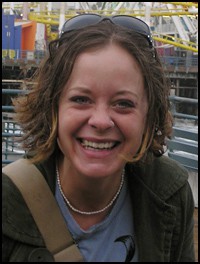Science Careers: Interview with Katie Hilpisch
 Name: Katie Hilpisch
Name: Katie Hilpisch
Current employer: Medtronic
Job title: Senior Biomedical Engineer
Science career: Biomedical Engineer
Time working in this field: 12 years
How would you describe your particular area of science and/or engineering and what you do?
Biomedical engineering involves engineering with medicine and biology. Simple, right? But biomedical engineers do all sorts of different things. My job is specific to helping find medical therapies for patients with heart problems. Other biomedical engineers look at how different substances interact in the human body and how to get images (MRI, echo) of our bodies. My job is all about math and medicine I guess.
What are some of the key characteristics that are important for a person to succeed in your type of work?
Networking, innovating, being able to work collaboratively on group projects, project management, and public speaking.
How did you become interested in this area of science and/or engineering?
My fourth-grade science teacher made me fall in love with science. In all reality, I hated physics, so chemistry (and chemical engineering) seemed the logical other choice.
What did you study in high school and college?
High School: All the math (trig, geometry, calculus) and science (biology, physics, chemistry) offered. My undergraduate degree is in chemical engineering (which comes with a minor in chemistry), so I took lots of chemistry classes. I did not go to graduate school.
What do you do during a typical day at work?
Lots of computer work and reading! Data analysis is a huge part of my job. So using software to analyze data and calculate statistics is a big part of my repertoire. And reading. Articles, books—anything that gives you insight into what has already been done or what other people are working on. We don’t want to re-invent the wheel, as they say.
How would you describe your work environment?
I would say a good 75% of my time is spent at my desk, working on the computer. The other 25% is spent in research labs or hospitals doing, well, research!
What do you enjoy most about your work? Is there anything that you do not like?
Hands down, I most enjoy helping patients. It is very rewarding to come to work every day and get the chance to do something that helps people who are sick. I also like that I learn new things almost every day.
Describe a project that you have worked on that was of particular interest to you.
There are so many new and different things that we work on! It is particularly fun for me to work at our Physiologic Research Lab, where we do a lot of our pre-clinical (animal) work. Also, it has been interesting to see Western medicine sort of collide with Eastern medicine, bringing about new approaches to holistic medicine and treatment of patients.
What can a student do now to prepare for a career in your field?
Go above and beyond school. What sets you apart? Do something nerdy outside of school. Join a group that takes apart toasters and puts them back together. Or even volunteer at a local science museum. Take advantage of chances to work in groups and to speak in front of groups. These are two important skills with which I wish I had had more practice.
Is there any advice you would give to someone interested in this field that you wish someone had given you when you were starting out?
For anyone (not just engineers!): Always do something you love. Then it won't be "work." Get out there and start meeting people. I am constantly reminded that it is often not what you know but who you know that matters.



